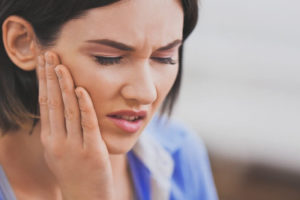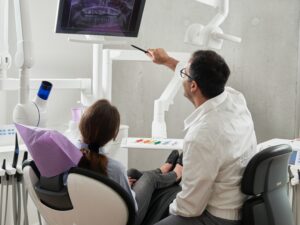Teeth grinding, or bruxism, is a condition where people clench or grind their teeth, often without realizing it. While it might seem harmless, teeth grinding can lead to many problems, including headaches. But how do you know if your headache is caused by grinding your teeth? Let’s explore the symptoms, the connection between bruxism and headaches, and what you can do to stop it.
What Does a Headache from Teeth Grinding Feel Like?

Headaches caused by teeth grinding have a distinct pattern. They are usually tension headaches, which are the most common type.
Characteristics of a Teeth-Grinding Headache:
- Location: These headaches often start at the temples or sides of the head and may feel like a dull ache or tight band around your head.
- Time of Day: Many people wake up with headaches caused by nighttime teeth grinding.
- Jaw Pain: Alongside the headache, you might feel soreness or tightness in your jaw.
- Recurring Nature: These headaches can happen frequently, especially after nights when grinding is worse.
If your headaches have these traits, bruxism might be the cause.
How Do You Know if Your Headache Is from Your Teeth?
Not all headaches come from teeth grinding, so how can you tell? There are a few clues to watch for.
Signs That Teeth Grinding Might Be the Cause:
- Jaw Pain:
If your jaw feels sore or stiff, especially when you wake up, this is a common sign of grinding. - Teeth Sensitivity:
Grinding can wear down your enamel, making your teeth more sensitive to hot, cold, or sweet foods. - Clicking Sounds:
If your jaw makes clicking or popping noises when you chew or open your mouth, grinding might be straining your jaw joint. - Worn or Flattened Teeth:
Look for signs of damage on your teeth, such as flattened edges, small cracks, or chips. - Tender Temples:
The muscles near your temples work hard when you grind your teeth. If these areas feel tender, it could be linked to bruxism.
If you’re unsure, a dentist can check for evidence of grinding, such as wear patterns on your teeth or damage to your jaw joint.
What Symptoms Can Teeth Grinding Cause?

Teeth grinding doesn’t just cause headaches; it can lead to a variety of uncomfortable symptoms.
Common Symptoms of Teeth Grinding:
- Facial Pain:
The muscles in your face can become sore from the constant tension of grinding. - Earaches:
Although the problem isn’t in your ears, the pressure from grinding can feel like an earache. - Tight or Sore Jaw:
Grinding can overwork your jaw muscles, leading to discomfort or a condition called temporomandibular joint disorder (TMJ). - Cracked or Chipped Teeth:
Over time, grinding can damage your teeth, making them more prone to cracks or chips. - Difficulty Sleeping:
Grinding can disrupt your sleep or your partner’s if it’s noisy. Poor sleep can also worsen headaches and stress levels. - Tooth Sensitivity:
Enamel wear from grinding can make teeth more sensitive to temperature and pressure.
How Do I Stop Grinding My Teeth?
Stopping teeth grinding requires understanding the causes. Bruxism can happen because of stress, misaligned teeth, or other medical conditions. Once the cause is identified, you can take steps to address it.
Ways to Reduce Teeth Grinding:
- Use a Mouth Guard:
- A mouth guard, also called a night guard, creates a barrier between your teeth.
- It prevents damage from grinding and can help relieve headaches and jaw pain.
- Custom guards from a dentist are the most effective, but over-the-counter options are available.
- Practice Stress Management:
- Stress is a common trigger for grinding. Finding ways to relax can help.
- Try relaxation techniques like yoga, meditation, or deep breathing exercises.
- Correct Bite Issues:
- If grinding is caused by misaligned teeth, a dentist or orthodontist may recommend braces or other treatments to fix your bite.
- Physical Therapy for Your Jaw:
- Stretching and strengthening exercises can ease tension in your jaw muscles.
- Massage or applying a warm compress can also provide relief.
- Avoid Stimulants Before Bed:
- Caffeine and alcohol can make grinding worse, especially at night.
- Try to avoid these substances in the evening to improve your sleep quality.
- Improve Sleep Hygiene:
- Poor sleep can increase stress and bruxism.
- Stick to a consistent bedtime, create a relaxing bedtime routine, and keep your bedroom quiet and dark.
- Talk to Your Doctor:
- If your grinding is linked to another condition, like sleep apnea, treating the underlying problem can reduce bruxism.
When to See a Dentist or Doctor

If you suspect you’re grinding your teeth, it’s a good idea to visit a dentist. They can confirm the diagnosis and recommend treatment options.
Signs You Need Professional Help:
- Persistent headaches that don’t go away with over-the-counter painkillers.
- Severe jaw pain or difficulty opening and closing your mouth.
- Noticeable damage to your teeth, such as cracks, chips, or flattening.
- Earaches or facial pain that doesn’t have another clear cause.
Your dentist might refer you to a specialist, such as a TMJ expert or a sleep doctor, if needed.
Final Thoughts
Teeth grinding can cause a wide range of problems, including tension headaches. If you frequently wake up with a headache, jaw pain, or other symptoms, bruxism could be to blame.
The good news is that there are many ways to manage and reduce teeth grinding. From stress relief techniques to custom mouth guards, you can find a solution that works for you. If you’re unsure, a visit to the dentist is the first step toward relief and better oral health.
Take care of your teeth, and don’t ignore the signs of grinding. Your head, jaw, and overall health will thank you!


 Due to recent weather-related closures and delays, select Lane & Associates Family Dentistry offices will have adjusted hours this Friday, January 30th. Some locations will be closing at 2:00 PM, while others will remain open until 5:00 PM. Please contact your local Lane & Associates office to confirm hours and availability.
Due to recent weather-related closures and delays, select Lane & Associates Family Dentistry offices will have adjusted hours this Friday, January 30th. Some locations will be closing at 2:00 PM, while others will remain open until 5:00 PM. Please contact your local Lane & Associates office to confirm hours and availability.